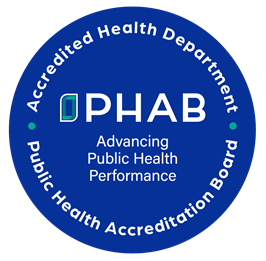1. What is a Certified Food Protection Manager Training Course?
ANSWER:
A Certified Food Manager Training Course is a course on food safety and sanitation. The course is administered by accredited providers that are authorized to administer the course.
2. Who is required to take the Certified Food Protection Manager Training Course?
ANSWER:
The Certified Food Protection Manager (CFPM) Training Course is required for an owner/manager or an employee (with supervisory responsibility) of a food facility that prepares, handles, or serves non-prepackaged, potentially hazardous, medium*and/or high*risk food.
3. Will I get a certificate after completing the Certified Food Protection Manager (CFPM) Training Course?
ANSWER:
No, however a verification of completion of the training will be issued at the end of the course which must be available in the facility upon request by the health department inspector. A CFPM certificate (not required at this time) is a certificate obtained after attending a food safety training course and completing the examination from an Accredited Organization. A list of Accredited Organizations can be found at www.ansi.org
4. How many managers/supervisory staff must complete the Certified Food Protection Manager (CFPM) course per food facility?
ANSWER:
There shall be at least one currently employed person [owner/manager or an employee (with supervisory responsibility)] that has completed a CFPM course per food facility.
5. How does one go about taking a Certified Food Protection Manager course?
ANSWER:
The course can be purchased online or can be taken in a class room.
6. How much training is required to obtain verification of participation in a Certified Food Protection Manager (CFPM) Training Course?
ANSWER:
|
Detail |
CFPM |
|---|---|
|
Training required |
At least 6-8 hours |
|
The verification is valid for |
5 years |
|
Can I use the certificate in multiple food facilities? |
Yes-Must be a supervisor/manager. |
7. How can I find an approved provider?
ANSWER:
A list of Accredited Certified Food Protection Manager Programs can be found at www.ansi.org. Be sure your training company uses one of the approved programs listed.
8. Are there training courses and examinations offered in different languages?
ANSWER:
Yes, the training courses are offered in different languages, however the employee must contact the provider to check for the availability of a specific languages.
9. What is done with the verification upon receipt?
ANSWER:
The original verification of completion of a certified managers training course shall be maintained at the place of business and shall be made available at time of inspection, a copy should be mailed with permit application to the Cattaraugus County Health Department.
10. How long is the Certified Food Protection Manager (CFPM) training course verification good for?
ANSWER:
The CFPM course verification is valid for five years.
11. What food service establishments will be required to have a Certified Food Protection Manager training course verification?
ANSWER:
Establishments that are required to have a Certified Food Managers training course verification are food establishments that serve medium*and/or high*-risk foods. There must be AT LEAST ONE Certified Food Managertraining course verification for each permit establishment.
12. Are there any on-site training offered at Cattaraugus County Health Department?
ANSWER:
No, not at this time.
13. Are there any classroom trainings offered in Cattaraugus County?
ANSWER:
Periodically, Yes. Please contact the Cattaraugus County Health Department at (716) 701-3386 to inquire if there is a classroom training scheduled in the future.
14. Is online training better than on-site training?
ANSWER:
Online training is easier than on-site training because it is convenient and self-paced. Many workers are so busy or live in areas where classroom sessions are not practical. Online offers much greater convenience. The self-paced nature of online allows each student to spend more time on the topics they are not familiar with and move more quickly through those that they are. In a classroom, everyone marches through the same topics for the same amount of time.
15. Similar course work was completed and a certificate/verification of training was received elsewhere. Does Cattaraugus County Health Department have reciprocity agreements with industry or other state health departments?
ANSWER:
Yes, if the course that you took meets the minimum training requirement for hours and content, and if the exam was American National Standards Institute (ANSI) and the Conference for Food Protection (ANSI-CFP)-approved. For more information, please contact Cattaraugus County Health Department, Environmental Health Division at 716-701-3386.
16. What if the person who completed the Certified Food Protection Manager Training Course Quits? How Long Do I Have To Get Another Manager Certified?
ANSWER:
In the event the person who completed the certified food protection manager training course leaves the employment of the food establishment or is relieved of food management responsibilities, the food establishment has 30 days from the date of the employment change to have a another person complete the certified food protection manager training course. However, the food establishment should notify Cattaraugus County Health Department Environmental Health Division at 716-701-3386 when this separation takes place, to avoid a temporary suspension of the operating permit.
17. What must I do to renew my Certified Food Protection Manager training course?
ANSWER:
Complete an approved American National Standards Institute (ANSI) training course during the 5 years after your verification of completion is issued, but before that verification expires. This may not be done after the verification of completion expires (no exceptions). You may renew up to one year in advance.
18. If I do not have a certificate after the required deadline what is the penalty.
ANSWER:
The food establishment will have their operating permit temporarily suspended. The food establishment can be issued a one-time temporary, one month permit for a $125.00 fee. The manager/employee (with supervisory responsibility) must complete a training course issued by an accredited certified food protection manager program within 30 days. If a certified food protection manager training course has not been obtained by a manager/employee (with supervisory responsibility) within this time frame, the food establishment permit will remain suspended until such time a certified food protection manager training course has been completed.
19. Can a Certified Food Protection Manager (CFPM) training verification be used in more than one food facility?
ANSWER:
Yes, but the person who has the certificate must be involved in the training of all facilities they work with and oversee all operations.
20. What would happen if my food facility does not have a Certified Food Protection Manager (CFPM) training verification when requested by the inspector?
ANSWER:
If the required CFPM training verification is not available on site at the time of inspection, your food facility will be cited for the violation and the food establishment will have their operating permit temporarily suspended.
21. Does theCertified Food Protection Manager Need to be on the Premises at all time?
ANSWER:
No, the certified food manager does not need to be present during all hours of operation, however, they are expected to be involved in daily operations and supervising other cooks and food handlers.
22. Will churches, fraternal or charitable organizations have to complete the Certified Food Protection Manager (CFPM) training course?
ANSWER:
A religious, fraternal or charitable organization that has its own facility and plans to prepare and serve food at the facility for an occasional event (once a week or less often) will not be required to complete a CFPM training course.
23. Will fire departments that sell food for special events have to complete the Certified Food Protection Manager (CFPM) training course?
ANSWER:
A fire department that has its own facility and plans to prepare and serve food at the facility for an occasional event (once a week or less often) will not be required to complete a CFPM training course.
24. Why should I choose ServeSafe for my Food Manager Certification?
ANSWER:
As long as it is an American National Standards Institute (ANSI)-approved Food Service Sanitation Manager Certification (FSSMC) course, it will be approved by the Cattaraugus County Health Department.
ANSI-CFP Accreditation Program (Accredited)
|
# |
Organization |
ID |
|---|---|---|
|
1 |
Learn2Serve Food Protection Manager Certification Program |
0975 |
|
2 |
AboveTraining/StateFoodSafety.com Certified Food Protection Manager (CFPM) Exam |
1020 |
|
3 |
National Registry of Food Safety Professionals Food Protection Manager Certification Program International Certified Food Safety Manager |
0656 |
|
4 |
National Restaurant Association ServSafe Food Protection Manager Certification Program |
0655 |
|
5 |
Food Protection Manager Certification Program |
0659 |
25. I only sell food at the local fireman's convention on one weekend a year under my tent. Do I have to be certified?
ANSWER:
Any temporary food operation that serve medium*and/or high*-risk foods will be required to complete a CFPM training course and show verification of completion before a permit will be issued.
26. I run a "mobile" food service wagon in the summer at local fairs. Do I have to take this Certified Food Protection Manager (CFPM) training?
ANSWER:
Any mobile food operation that serve medium*and/or high*-risk foods will be required to complete a CFPM training course and show verification of completion before a permit will be issued.
27. Why Receive Food Protection Manager Training?
ANSWER:
According to the Centers for Disease Control (CDC) the majority of food-borne illnesses in the United States are attributed to public eating establishments. This proactive training will:
-
- Safeguard the health of your customers and employees.
- Protect the public image and reputation of your establishment.
- Reduce the risk of lawsuits and high insurance premiums at your establishment.
- Allow you the confidence of knowing your employees consistently prepare and serve food in a safe and sanitary manner.
- Improve your establishment
Establishments which serve potentially hazardous foods that require a great deal of processing on the premises, including: manual handling, cooling, re-heating, holding for service - hot or cold, transportation of hot or cold ready-to-eat meals and preparation of foods several hours or days before service. Epidemiologic experience has demonstrated that menu items served by these facilities are common vehicles of foodborne illnesses. This category includes establishments that often serve large numbers of meals to the aged, children, or the infirm. Examples of establishments in the high-risk category include: those which prepare roasted meats, sauces, gravies, casseroles, potentially hazardous baked goods and foods which contain meat, fish, poultry, dairy products, eggs or shellfish.
These establishments often serve potentially hazardous foods; however, there is a rapid turnover between preparation and service. This group also includes low-risk foods that may or may not be potentially hazardous, but require extensive handling, such as baked goods and pizzas. Many of these establishments serve a large volume of food and, therefore, require close attention, although their food borne illness risk is low. Examples of establishments in the medium-risk category include: fast food restaurants, submarine shops, pizza parlors, some retail bakeries, some mobile food establishments, and short order breakfast and lunch establishments.
Most of these establishments serve no potentially hazardous foods with the possible exception of prepackaged sandwiches and specialty items, such as pickled meats or eggs, cream-filled donuts and other snack foods. The regulatory concern in these establishments relates more to sanitation and maintenance. Examples of establishments in the low-risk category include: bars, taverns, retail doughnut shops, some temporary food operations, and coffee shops.


